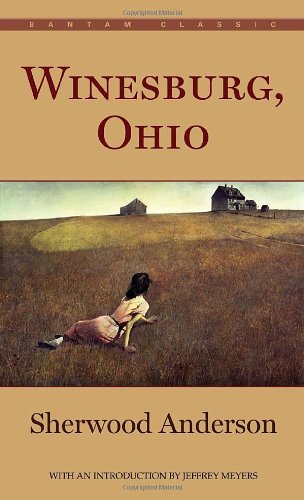
"The story of Wing Biddlebaum is the story of hands," so saith Sherwood Anderson in the first story of his famous small-town tales, Winesburg, Ohio. From the very first time I read that story, long, long ago, I was taken by Biddlebaum's fragile existence and the very thin line that separates good and evil, love and sin.
As if he were leprous, Old Wing lives just outside of town. He was once a schoolteacher, a man who loved children too much maybe, so much he couldn't keep his hands off of them. He'd always had active hands, fingers that moved with an agility that was, even to those who disliked him, almost mythical. Already as a child, he'd picked berries with precision and speed that exceeded everyone else in the berry patch.
For reasons known only to Sherwood Anderson, strange Wing Biddlebaum opens up about life and living only to George Willard, the boy who becomes a man in Winesburg, Ohio, the kid who is fascinated by the community's eccentrics. George Willard somehow trusts the old teacher, so the two of them walk together out into the countryside, and when they do, Wing, once a teacher, finds himself back in a kind of classroom. Once again, as they had years ago, his hands begin to move.
For once he forgot the hands. Slowly they stole forth and lay upon George Willard's shoulders. Something new and bold came into the voice that talked. "You must try to forget all you have learned," said the old man. "You must begin to dream. From this time on you must shut your ears to the roaring of the voices."That look of horror is rooted in his own dark experience as a teacher, when he was accused of using his hands improperly, of doing things with them--and with his students--that were untoward. Accusations were made, and the sentence he was handed was banishment from the classroom. Years later, on summer nights he sits alone on his porch outside of town, restraining his hands, a forlorn but not forgotten "grotesque," as Anderson calls the him and the other misshapen characters in Winesburg.
Pausing in his speech, Wing Biddlebaum looked long and earnestly at George Willard. His eyes glowed. Again he raised the hands to caress the boy and then a look of horror swept over his face.
Was Wing what today we could call as abuser, a sex offender? That question is never answered fully in the story. All we know is that once upon a time those too active hands prompted an accusation that got him removed forever from the classroom, and that kills him.
Sounds awful, but I thought of Wing yesterday again because a couple dozen third and fourth graders came by the museum and wanted to know about Indians. I walked them through the gallery of beaded moccasins and ceremonial shirts, past buffalo skins decorated with stories of fights and battles, past tools crafted from bone and stone, and wherever we stopped they stuck their hands in my face, full of questions, full of life, full of joy at learning, the kind of patrons museum docents adore.
Their enthusiasm was so high that more than once in the bedlam, when I'd call on one one of them, they'd momentarily forgotten what they were going to ask. A straggler or two didn't much care about keeping up with the rest of the group, but mostly they were something of a team, maybe even a mob in their enthusiasm. They wanted to know everything. If there were more kids coming today, I'd go back and walk them through in a heartbeat.
The truth? This old grandpa wanted to touch them. I did. When they'd stick their hands up in my face, full of questions, I wanted to grab those hands and squeeze. One little girl with braids and huge brown eyes told me, "My grandma is an Indian." I could have hugged 'em, every one of them. I could have touched them, would have loved to. They were excited to learn, and I couldn't keep up with their questions. It was a joy I wanted to touch.
But I couldn't, could I?
All I know is the kids were darling, and I wanted to touch them. That's what made me think of old Wing Biddlebaum, a sad story really, as many of them are in Winesburg, Ohio. That grandpa impulse in me made me wonder again about the fragility of our lives, of the terrible tension created between hands that love and hands that don't.
1 comment:
This brings to mind the story shared by a lady who served a lifetime in India in Christian education. She came back to pick up some new skills in the US and ended up in a classroom in a inner city school in a large metro area. She was shocked when a young girl called her out on "touching". What was normal and acceptable, and actually expected, behavior in India had become unacceptable here in the US. Social norms vary and do change.
Post a Comment